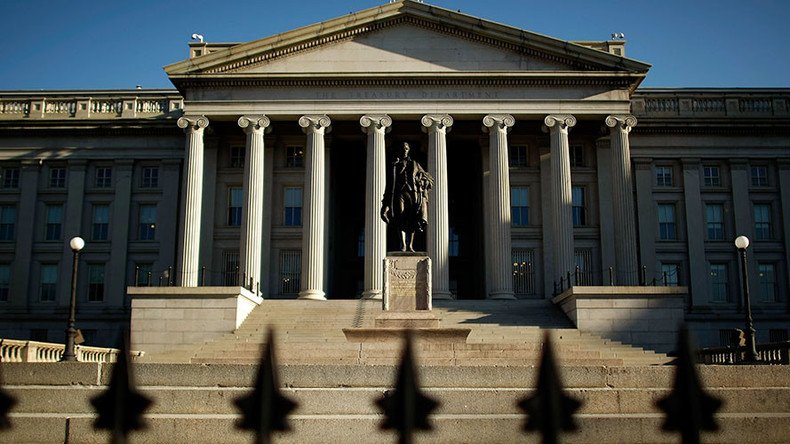Bad rules: Obama invokes Panama Papers as US Treasury moves to stop corporate tax dodgers

President Barack Obama criticized “poorly designed” laws allowing for illicit money transfers worldwide as the US Treasury issued new rules to stop companies from avoiding US taxes simply by buying up foreign businesses and changing their headquarters.
This relocation behavior, known as a corporate tax “inversion,” has come under heavy fire from lawmakers because companies move their headquarters overseas to claim a lower tax residence and, at the same time, keep their core operations and management based in the United States. Once an inversion is successful, the company no longer becomes subject to US corporate tax laws.
Companies looking to invert their tax residence often do so in order to get away from the 35 percent corporate tax rate in the US. In countries like the UK and Ireland, the rate is 20 percent and 12 percent, respectively.
“Treasury has taken action twice to make it harder for companies to invert. These actions took away some of the economic benefits of inverting and helped slow the pace of these transactions, but we know companies will continue to seek new and creative ways to relocate their tax residence to avoid paying taxes here at home,” said Treasury Secretary Jacob Lew in a statement.
Though the Treasury did not specify any corporate inversions in its rules, many analysts see the potential merger between drug company Pfizer and Allergan as a primary target. Pfizer is looking to buy Allergan and move its tax residence to Ireland later this year. The move would save Pfizer some $35 billion in taxes and be the largest corporate inversion ever.
“Tax avoidance is a big, global problem,” President Obama said on Tuesday, invoking the release of the Panama Papers, which revealed offshore accounts and tax avoidance schemes connected with Iceland Prime Minister Sigmundur David Gunnlaugsson, Argentinian President Mauricio Macri, associates of Russian President Vladimir Putin, and others. “A lot of it is legal, but that’s exactly the problem,” Obama said.
JUST IN: Pres. Obama addresses massive #PanamaPapers leak. https://t.co/6JLe4Egf54
— NBC Nightly News (@NBCNightlyNews) April 5, 2016
Obama criticized laws “so poorly designed” that loopholes allow companies to avoid responsibilities ordinary citizens have to abide by. The ensuing loss of revenue means the government can’t invest as much in infrastructure, schools and creating opportunities for all Americans, Obama said.
“Big corporations are playing by a different set of rules,” he added. Obama also mentioned the possibility of lowering the corporate tax rate to reduce inversions.
Under the new rules issued by the Treasury on Monday, a three-year limit will be placed on acquisitions of American companies by foreign companies hoping to be part of an inversion deal. This rule targets foreign businesses that buy up smaller US companies so that they can become larger and avoid regulations that would otherwise stop an inversion.
In the Pfizer-Allergan case, Allergan bought several US companies over the past three years, including spending nearly $100 million to merge with the pharmaceutical company Actavis and purchase both Forest Laboratories and Warner Chilcott. The moves made Allergan larger and diluted the ownership stake of Pfizer to 56 percent, just under the threshold Congress established in order to limit inversions, according to the Washington Post.
If a company owns 60 percent or more of a foreign business, an inversion cannot take place.
"In simple words, Allergan's key deals in the prior 36 months won't be counted (as far as meeting the inversion threshold is concerned) when doing the ownership math for the Pfizer-Allergan deal," Evercore analyst Umer Raffat wrote in a note, Reuters reported.
Pfizer did not comment on the rules except to say it is reviewing them.
Another rule proposed by the Treasury would target corporate “earnings stripping,” in which businesses accept loans from their foreign parent companies in order to pay fewer taxes on profits from the US. By making interest payments on those loans, companies can deduct that money from its taxable income.
These actions would “further rein in inversions and reduce the ability of companies to avoid taxes,” Lew said, but he added that inversions can’t be fully stopped unless Congress takes action. President Obama has repeatedly called on lawmakers to do so, but so far the GOP-controlled Congress has not passed the appropriate legislation.
Panama Papers: 'Biggest leak in history' on corruption https://t.co/jpM8MJdG8zpic.twitter.com/fCNQF2dPN9
— RT (@RT_com) April 4, 2016
Already, the Organization for International Investment group, which lobbies for foreign companies, has come out against the regulations.
"Treasury’s action would increase the cost of investing and expanding across the United States for all foreign companies and put at risk more than 12 million American workers that are supported by foreign direct investment in the United States," Nancy McLemon, the group's chief executive, said in a statement to Reuters.
According to the Treasury, 23 inversions have occurred since 2012, significantly more than the three total in 2010 and 2011.














